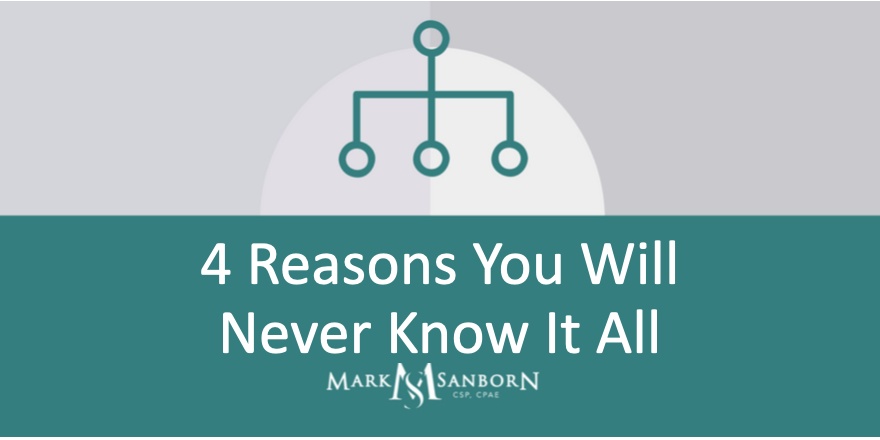Reid Hoffman, co-founder of Linked-In, said, “Don’t be a know it all, be a learn it all.”
I agree with the sentiment. Literally you can’t know it all, but you can be committed to continuous learning. Any of us can increase our bandwidth for new information and better ideas.
Thomas Young is the polymath considered by some to be the last person to know everything. He died in 1829.
Knowing that you can’t know it all balanced by the quest to learn as much as possible keeps you humble and hungry. Here’s why neither you nor I will ever know it all.
1. Some things you only learn with age.
You can be “wise beyond your years,” but you will be even wiser with more years of life experience under your belt.
I once heard John Bradshaw say, “There are some issues with your significant other you will never experience until you marry. That’s why they’re called ‘marital issues.'”
The same is true with age. There are just some things you can’t truly know until you’ve lived them and had a chance–over time–to draw out the lessons.
2. Some things you only learn with experience.
Knowledge can be direct or indirect. You can tell me about your visit to Thailand, and I will know more than I did about that country than before our conversation. But if I visit Thailand, my increase in knowledge with be richer.
I’ve always made the case for trying lots of things, not just to find what you like or dislike, but to add to your cadre of knowledge.
Importantly, experience in and of itself won’t teach you much. It is up to you to find and extract the lessons.
3. Some things you thought you learned need to be unlearned
There are some things I believed in the past that I no longer believe. I had reason to believe them then, but new information, experience and age combined to change my thinking. Letting go of outdated or inaccurate information is difficult. We are creatures of habit, often looking for the path of least resistance. To unlearn you’ve got to be willing to closely examine what you believe and why. Too much bad information in your brain takes up space better used by better ideas.
4. New ideas are being discovered all the time.
Especially in the sciences, there are things that can’t be learned for the simple reason that they are not yet known.
Depending on the source, the amount of knowledge and/or data (the two are not the same) in the world is doubling every 13 to 24 months.
Finding useful ideas and applications requires converting data into knowledge, and that isn’t easy. But the sheer magnitude of resources available to us over time is staggering
You nor I will ever know it all. Bad news? Not at all.
I find it exciting that regardless of age or experience, there are still exciting and interesting things to learn about and to add the reservoir of knowledge we posses. Whether we learn for practical reasons or just for fun (and I try always to combine the two), there isn’t a better time to be alive when we can be assured we will have never learned it all.
Mark Sanborn is an award winning speaker and Leadership Expert in Residence at High Point University, the Premier Life Skills University. For more information about his work, visit www.marksanborn.com.








